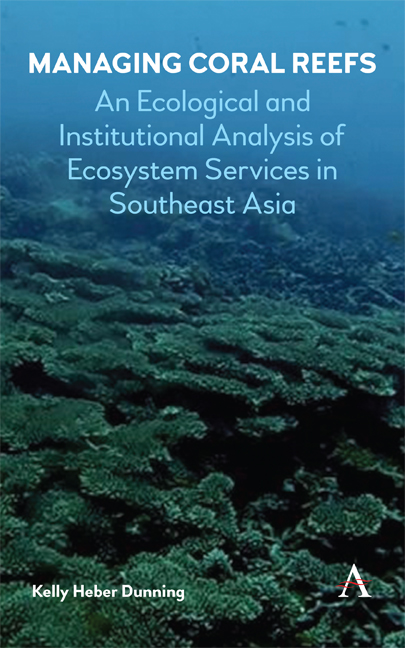 Managing Coral Reefs
Managing Coral Reefs Book contents
- Frontmatter
- Contents
- List of Figures
- List of Tables
- Acknowledgments
- List of Abbreviations
- 1 Introduction
- 2 Theory, Practice and Policy Context of Coral Reef Management
- 3 Governing Natural Resources in Indonesia and Malaysia
- 4 Case Study Sites and the Coral Triangle
- 5 Integrated Management of Marine Protected Areas
- 6 Legitimate Marine Protected Areas
- 7 Adaptive Capacity of Marine Protected Areas
- 8 Policy Recommendations for Marine Protected Area Management in Developing Countries
- Appendix A Research Design
- Appendix B Data and Methods
- Appendix C Coral Cover Results
- References
- Index
4 - Case Study Sites and the Coral Triangle
Published online by Cambridge University Press: 16 August 2018
- Frontmatter
- Contents
- List of Figures
- List of Tables
- Acknowledgments
- List of Abbreviations
- 1 Introduction
- 2 Theory, Practice and Policy Context of Coral Reef Management
- 3 Governing Natural Resources in Indonesia and Malaysia
- 4 Case Study Sites and the Coral Triangle
- 5 Integrated Management of Marine Protected Areas
- 6 Legitimate Marine Protected Areas
- 7 Adaptive Capacity of Marine Protected Areas
- 8 Policy Recommendations for Marine Protected Area Management in Developing Countries
- Appendix A Research Design
- Appendix B Data and Methods
- Appendix C Coral Cover Results
- References
- Index
Summary
Situating This Research in Global Environmental Research Agendas
This chapter situates this book in the wider global development context. The 1992 Rio meetings, generally viewed as a turning point in the history of sustainable development, named research priorities for linked human and environmental systems in the context of environmental degradation. These priorities included (1) analyzing the social determinants of environmental change, (2) understanding institutions for natural resource management and their effects on biophysical systems and (3) improving governance and societal response (Ostrom 1990; NRC 1999; Moran 2010). These three research priorities must be analyzed comparatively across regions and ecosystems, and in a way that is spatially explicit, anchored in a context (Moran and Ostrom 2005). Section 2.1 describes urgent calls for research on institutional change in the Millennium Ecosystem Assessment, the individual country plans of the CBD, the proceedings of theWorld Summit on Sustainable Development and the World Parks Congress. I draw on these combined calls for research on institutional change by comparing marine protected areas (MPAs) in Malaysia and Indonesia for ecological and social outcomes using a socioecological systems framework.
Why MPAs in the Coral Triangle?
This book compares Malaysian and Indonesian reef management institutions, specifically MPAs, for several reasons. First, MPAs are the main social arrangements that people use to manage coral reefs. Second, Malaysia has centralized reef management through its federally managed marine parks, whereas Indonesia is expanding co-managed MPA coverage (while still possessing a range of centrally managed MPAs). Third, as outlined in Section 2.1, the CBD and the corresponding national plans for Indonesia and Malaysia on biodiversity conservation place MPAs at the center of their governance strategies for protecting coral reefs. The CBD, the 2001 World Summit on Sustainable Development and the 2003 World Parks Congress called on governments, stakeholder communities and nongovernmental organizations (NGOs) to create a global network of MPAs (Vernon et al. 2009) and thus they are increasingly popular conservation tools.
- Type
- Chapter
- Information
- Managing Coral ReefsAn Ecological and Institutional Analysis of Ecosystem Services in Southeast Asia, pp. 35 - 64Publisher: Anthem PressPrint publication year: 2018


